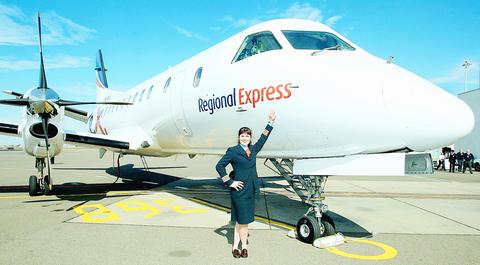Australia's new regional airline took to the skies yesterday, but one industry expert warned it faced a bumpy ride given the high costs involved.
Regional Express, to be known as REX, is owned and operated by Australiawide Airlines. The consortium is a merger of regional carriers Kendall and Hazelton Airlines.
Kendall and Hazelton were subsidiaries of Ansett Airlines, once Australia's largest domestic carrier, which collapsed earlier this year with unsustainable debts. While Ansett stopped flying, Kendall and Hazelton stayed in the air.

PHOTO: AFP
REX will have a fleet of 29 SAAB 340 and Metro 23 turboprop aircraft. It will initially fly 1,300 times a week between 35 regional and metropolitan destinations in New South Wales, Victoria, South Australia and Tasmania states.
But as the new carrier embarked on its inaugural flight yesterday from Wagga Wagga in southwest New South Wales to Sydney, Aircraft Owners and Pilots' Association technical director Bill Hamilton said the airline would be lucky to still be operating within six months.
"Airport charges, fuel charges, the cost of maintaining aircraft, the cost of paying for all the services you have to have for an aircraft ... are really quite high," Hamilton told Australian Broadcasting Corp radio. At the end of the day, this is what will beat them," he said.
But Australiawide Airlines CEO Michael Jones said he was confident of the airline's future. He said that since creating the new airline last Thursday, bookings have increased about 25 percent over the preceding week's figures for Kendall and Hazelton. He dismissed Hamilton's comment as ``both uninformed and irrelevant on the basis that he hasn't seen our business plan.''
Jones said REX was different to other carrier that have tried and failed to break into Australia's regional routes because it was a merger of two established airlines.
"So we don't have to establish the infrastructure, we don't have to train the people and we don't have to establish the markets," he said.
Ansett Airlines and Qantas Airways dominated the sector for decades, but Ansett collapsed this year after a cutthroat price war with Qantas and Virgin Blue.

DAREDEVIL: Honnold said it had always been a dream of his to climb Taipei 101, while a Netflix producer said the skyscraper was ‘a real icon of this country’ US climber Alex Honnold yesterday took on Taiwan’s tallest building, becoming the first person to scale Taipei 101 without a rope, harness or safety net. Hundreds of spectators gathered at the base of the 101-story skyscraper to watch Honnold, 40, embark on his daredevil feat, which was also broadcast live on Netflix. Dressed in a red T-shirt and yellow custom-made climbing shoes, Honnold swiftly moved up the southeast face of the glass and steel building. At one point, he stepped onto a platform midway up to wave down at fans and onlookers who were taking photos. People watching from inside

A Vietnamese migrant worker yesterday won NT$12 million (US$379,627) on a Lunar New Year scratch card in Kaohsiung as part of Taiwan Lottery Co’s (台灣彩券) “NT$12 Million Grand Fortune” (1200萬大吉利) game. The man was the first top-prize winner of the new game launched on Jan. 6 to mark the Lunar New Year. Three Vietnamese migrant workers visited a Taiwan Lottery shop on Xinyue Street in Kaohsiung’s Gangshan District (崗山), a store representative said. The player bought multiple tickets and, after winning nothing, held the final lottery ticket in one hand and rubbed the store’s statue of the Maitreya Buddha’s belly with the other,

‘COMMITTED TO DETERRENCE’: Washington would stand by its allies, but it can only help as much as countries help themselves, Raymond Greene said The US is committed to deterrence in the first island chain, but it should not bear the burden alone, as “freedom is not free,” American Institute in Taiwan Director Raymond Greene said in a speech at the Institute for National Defense and Security Research’s “Strengthening Resilience: Defense as the Engine of Development” seminar in Taipei yesterday. In the speech, titled “Investing Together and a Secure and Prosperous Future,” Greene highlighted the contributions of US President Donald Trump’s administration to Taiwan’s defense efforts, including the establishment of supply chains for drones and autonomous systems, offers of security assistance and the expansion of

STREAMLINED: The dedicated funding would allow the US to transfer equipment to Taiwan when needed and order upgraded replacements for stockpiles, a source said The US House of Representatives on Thursday passed a defense appropriations bill totaling US$838.7 billion, of which US$1 billion is to be allocated to reinforcing security cooperation with Taiwan and US$150 million to replace defense articles provided to the nation. These are part of the Consolidated Appropriation Act, which the US House yesterday passed with 341 votes in favor and 88 against. The act must be passed by the US Senate before Friday next week to avoid another government shutdown. The US House Committee on Appropriations on Monday unveiled the act, saying that it allocates US$1 billion for the Taiwan Security Cooperation Initiative